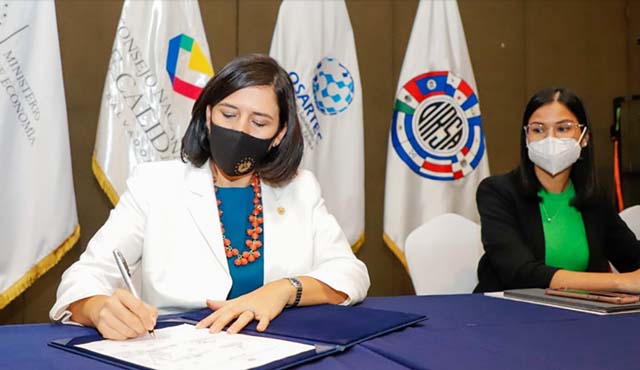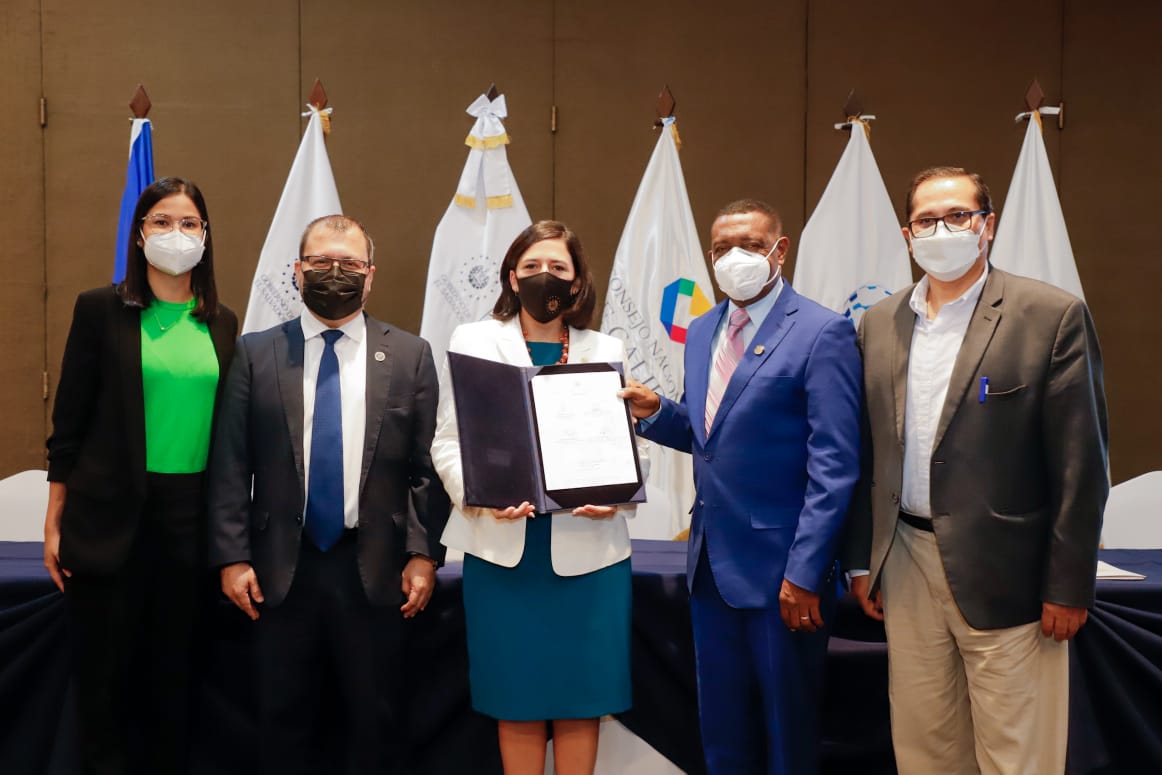El Salvador / CONACODEX signs Strategic Plan of the National Codex Program
On 23 September 2021 the Strategic Plan of the National Codex Alimentarius Program was signed by the members of the National Codex Committee – CONACODEX – in the presence of the President of the National Quality Council, Maria Luisa Hayem Brevé, Dr. Carlos Gabriel Alvarenga, Vice Minister of Health Management and Development, Dr. Giovanni Escalante representing PAHO / WHO in El Salvador, and Lic. Raúl Peralta, Regional Director of Food Safety, of the International Regional Organization for Agricultural Health (OIRSA), the latter in their capacity as witnesses of honor.
(left to right) Director of OSARTEC Raquel Martínez, Dr. Carlos Gabriel Alvarenga, Vice Minister of Health Management and Development, Minister Maria Luisa Hayem Brevé, Raúl Peralta, Regional Director of Food Safety, OIRSA, Dr. Giovanni Escalante, PAHO/WHO El Salvador
The Strategic Plan is the first of its kind since it has been defined jointly by the public, private, academic and consumer sectors, with the purpose of consolidating the actions of the National Codex Program in El Salvador and aiming for the standards that emanating from the Codex Alimentarius are a reference in all public policy decisions in health related to food safety.
Likewise, this Plan constitutes the first product of the El Salvador-Guatemala Binational Project of the FAO / WHO Trust Fund of the Codex Alimentarius, led by the Salvadoran Organization for Technical Regulation-OSARTEC.
The Director of OSARTEC, Ms. Raquel Martínez, considers the signing of this plan as: “ a historic achievement of the articulated work of the different national sectors in favor of consolidating the National Codex Program, strengthening the national objectives in matters of food safety and trade. In this way, it is evident that, in El Salvador, food safety is everyone's business”.

Minister María Luisa Hayem Brevé (left) and Director of OSARTEC Raquel Martínez
The Codex National Strategic Plan will be implemented in a period of 3 years, beginning in 2022 and ending in 2024, with its implementation it is expected to achieve a significant improvement in the protection and health of consumers at the national level and facilitate the international food trade.
“With the signing of this plan, one of the objectives is to promote the increase in exports of this sector (agro-industry, food and beverages), providing tools that help them to produce with quality. The assurance of safety constitutes, without a doubt, the ideal passport for our food exports”, Minister Hayem stated.
"The Bi-national Project (El Salvador/Guatemala) - Codex Trust Fund - ¡Juntos por la Inocuidad! supports the strengthening of the National Codex Alimentarius Commissions of El Salvador and Guatemala, where it has been collaborating in a significant way to improve the capacities and intersectoriality required in these countries,” said Marco Vigilato Adviser, Veterinary Public Health at PANAFTOSA/SPV-OPS/OMS “The goal of the Strategic Plan of the National Codex Programme of El Salvador is to improve national capacities for the safety and mitigation of ETA as well as to better position the country in the international food trade. The Veterinary Public Health Area of the OPS, through the Food Safety Unit, provides technical cooperation to countries in the implementation of the Codex Trust Fund projects in the Americas”.
@FAOWHOCodex, agradecemos su acompañamiento para asegurar la producción de alimentos de calidad. Esta será el pasaporte de los alimentos de 🇸🇻 al 🌍. https://t.co/mzEAZQhv6e
— María Luisa Hayem 🇸🇻 (@MariaLuisaHayem) September 24, 2021
Learn more
Publication: Codex Trust Fund Year in Review 2018
At the heart of the Codex mandate are the core values of collaboration, inclusiveness, consensus building and transparency. Governmental and non-governmental, public and private organizations alike play a vital role in ensuring Codex texts are of the highest quality and based on sound science.
Codex would have little authority in the field of international standard setting if it did not welcome and acknowledge the valuable contributions made by observers. Expert technical bodies, industry and consumer associations
contribute to the standard-setting process in a spirit of openness, collaboration and transparency.
Intergovernmental organizations (IGOs) and international non-governmental organizations (NGOs) can apply for observer status in Codex in order to attend and put forward their views at every stage of the standard-setting process.
 Current Codex Alimentarius Commission
Current Codex Alimentarius Commission
El Salvador / CONACODEX signs Strategic Plan of the National Codex Program
On 23 September 2021 the Strategic Plan of the National Codex Alimentarius Program was signed by the members of the National Codex Committee – CONACODEX – in the presence of the President of the National Quality Council, Maria Luisa Hayem Brevé, Dr. Carlos Gabriel Alvarenga, Vice Minister of Health Management and Development, Dr. Giovanni Escalante representing PAHO / WHO in El Salvador, and Lic. Raúl Peralta, Regional Director of Food Safety, of the International Regional Organization for Agricultural Health (OIRSA), the latter in their capacity as witnesses of honor.
(left to right) Director of OSARTEC Raquel Martínez, Dr. Carlos Gabriel Alvarenga, Vice Minister of Health Management and Development, Minister Maria Luisa Hayem Brevé, Raúl Peralta, Regional Director of Food Safety, OIRSA, Dr. Giovanni Escalante, PAHO/WHO El Salvador
The Strategic Plan is the first of its kind since it has been defined jointly by the public, private, academic and consumer sectors, with the purpose of consolidating the actions of the National Codex Program in El Salvador and aiming for the standards that emanating from the Codex Alimentarius are a reference in all public policy decisions in health related to food safety.
Likewise, this Plan constitutes the first product of the El Salvador-Guatemala Binational Project of the FAO / WHO Trust Fund of the Codex Alimentarius, led by the Salvadoran Organization for Technical Regulation-OSARTEC.
The Director of OSARTEC, Ms. Raquel Martínez, considers the signing of this plan as: “ a historic achievement of the articulated work of the different national sectors in favor of consolidating the National Codex Program, strengthening the national objectives in matters of food safety and trade. In this way, it is evident that, in El Salvador, food safety is everyone's business”.

Minister María Luisa Hayem Brevé (left) and Director of OSARTEC Raquel Martínez
The Codex National Strategic Plan will be implemented in a period of 3 years, beginning in 2022 and ending in 2024, with its implementation it is expected to achieve a significant improvement in the protection and health of consumers at the national level and facilitate the international food trade.
“With the signing of this plan, one of the objectives is to promote the increase in exports of this sector (agro-industry, food and beverages), providing tools that help them to produce with quality. The assurance of safety constitutes, without a doubt, the ideal passport for our food exports”, Minister Hayem stated.
"The Bi-national Project (El Salvador/Guatemala) - Codex Trust Fund - ¡Juntos por la Inocuidad! supports the strengthening of the National Codex Alimentarius Commissions of El Salvador and Guatemala, where it has been collaborating in a significant way to improve the capacities and intersectoriality required in these countries,” said Marco Vigilato Adviser, Veterinary Public Health at PANAFTOSA/SPV-OPS/OMS “The goal of the Strategic Plan of the National Codex Programme of El Salvador is to improve national capacities for the safety and mitigation of ETA as well as to better position the country in the international food trade. The Veterinary Public Health Area of the OPS, through the Food Safety Unit, provides technical cooperation to countries in the implementation of the Codex Trust Fund projects in the Americas”.
@FAOWHOCodex, agradecemos su acompañamiento para asegurar la producción de alimentos de calidad. Esta será el pasaporte de los alimentos de 🇸🇻 al 🌍. https://t.co/mzEAZQhv6e
— María Luisa Hayem 🇸🇻 (@MariaLuisaHayem) September 24, 2021
Learn more
Publication: Codex Trust Fund Year in Review 2018
 Codex and Observer
Codex and Observer
around the world since ancient times.
We might not always know where it comes from,
but we expect it to be available, safe and of good quality.










Leave a comment